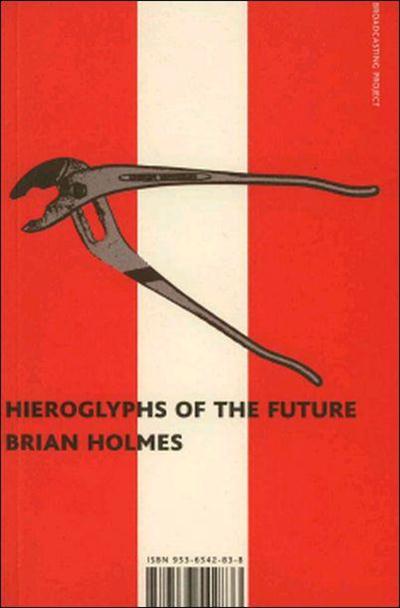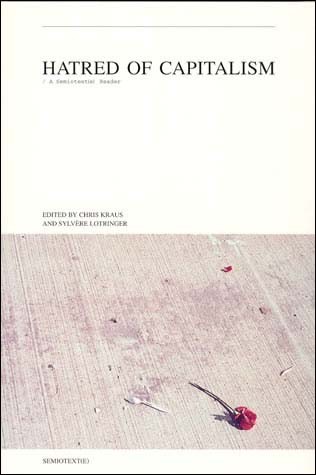Brian Holmes: Hieroglyphs of the Future: Art & Politics in a Networked Era (2003)
Filed under book | Tags: · activism, art, capitalism, critique, cybernetics, mapping, media activism, network culture, politics, social movements

“Networks redefine urban and social borders and can be interpreted in many ways according to the chosen perspective, a limited territory or the entire globe, revealing at the same time the potential and the limits of their actions. This collection of essays, which features a solid political approach intertwined with art, pushes the limits of the critique of the mobility as defined by human beings and the reconfiguration of urban space, analyzing the powers and desired contained in it. A hyperlinking of transnational forces of opposition are invited to play a strategic game coordinating their efforts for imagining future alternative and sustainable realities, through a media struggle which uses the same propaganda tools of capitalism. The collaboration with the art collective Bureau D’Etudes and the resulting maps of power produced by them are nodal, but the core of these essays are the instruments of analysis offered, which elaborate new expressions to effectively decode our contemporary world.”
Publisher Arkzin Communications / What, How and for Whom, Paris/Zagreb, 2003
Broadcasting series, 3
ISBN 9536542838, 9789536542833
294 pages
PDF (updated on 2015-4-28)
Comment (0)Chris Kraus, Sylvère Lotringer (eds.): Hatred of Capitalism: A Reader (2001)
Filed under book | Tags: · activism, capitalism, cultural resistance, philosophy, subjectivity, theory

“Compiled in 2001 to commemorate the passing of an era, Hatred of Capitalism brings together highlights of Semiotext(e)’s most beloved and prescient works. Founded by French theorist and critic Sylvère Lotringer as a scholarly journal in 1974, Semiotext(e) quickly took on the mission of melding French theory with the American art world and punk underground. Its Foreign Agents, Native Agents, Active Agents and Double Agents imprints have brought together thinkers and writers as diverse as Gilles Deleuze, Assata Shakur, Bob Flanagan, Paul Virillio, Kate Millet, Jean Baudrillard, Michelle Tea, William S. Burroughs, Eileen Myles, Ulrike Meinhof, and Fanny Howe. In Hatred of Capitalism, editors Kraus and Lotringer bring these people together in the same volume for the first time.”
Assistant editors: Shannon Durbin and Tessa Laird
Publisher Semiotext(e), Los Angeles, 2001
Double Agents series
ISBN 1584350121, 9781584350125
421 pages
Review: Brian Dillon (Mute, 2002).
Interview with editor (Leo Edelstein, Log, 2001).
PDF (12 MB, updated on 2019-2-25)
Comment (0)Brian Massumi: A User’s Guide to Capitalism and Schizophrenia. Deviations from Deleuze and Guattari (1992)
Filed under book | Tags: · abstract machine, body without organs, capitalism, marxism, philosophy, politics, psychoanalysis

A User’s Guide to Capitalism and Schizophrenia is a playful and emphatically practical elaboration of the major collaborative work of the French philosophers Gilles Deleuze and Felix Guattari. When read along with its rigorous textual notes, the book also becomes the richest scholarly treatment of Deleuze’s entire philosophical oeuvre available in any language. Finally, the dozens of explicit examples that Brian Massumi furnishes from contemporary artistic, scientific, and popular urban culture make the book an important, perhaps even central text within current debates on postmodern culture and politics.
Capitalism and Schizophrenia is the general title for two books published a decade apart. The first, Anti-Oedipus, was a reaction to the events of May/June 1968; it is a critique of “state-happy” Marxism and “school-building” strains of psychoanalysis. The second, A Thousand Plateaus, is an attempt at a positive statement of the sort of nomad philosophy Deleuze and Guattari propose as an alternative to state philosophy.
Publisher MIT Press, 1992
ISBN 0262132826, 9780262132824
229 pages
PDF (updated on 2012-7-24)
Comments (2)
